Home > Welcome > General medicine > Functional disorders > True False-sick
True False-sick
Sunday 9 September 2007
All the versions of this article: [English] [français]
The "True False-sick" ’really’ suffers. But, since no explanation can be found for the sickness, the medical profession and, sometimes, the subject him/herself, agree to think that "it’s in the head".
We belive, that misunderstood sick person presents symptoms of an onsetting hyposleep syndrome.
At that stage, sleep disorders are not visible and the spontaneous improvement is the rule. But if the cause persists, a new symptom will show up and the patient will have to consult again.
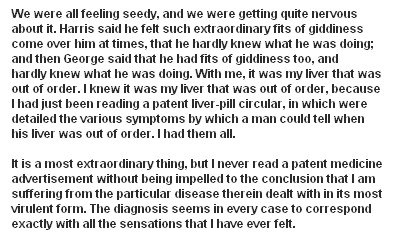
- Three men in a boat, Jerome K Jerome, 1889
Hypochondria or psychosomatic disease?
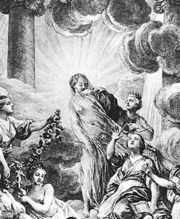
- Fragment of the frontispiece of the Encyclopedia : the Truth irradiating light can be seen; to the right, Reason and Philosophy tear of its veil (Wikipedia)
The False-sick is the one who «imagines» he/she suffers from an illness and who consults endlessly in the hope of recovering thanks to « Science ».

- A terrible misunderstanding
The word "hypochondriac" goes back to the remote and obscure era when illnesses were defined by their location. Thus :
to suffer in the area beneath the ribs was named «hypochondria»,
just like to suffer from the uterus was called «hysteria»
and angina stands for the irradiation towards the throat of a pain rooted in the heart.
It took no less than the discovery of the subconscious (the 3rd trauma of mankind after Darwin and Galileo’s discoveries), [1] to call the (organicist) biomedical model of the XVIIIth century into question with the psychoanalytical theories and the concept of « psychosomatic » disease.
These people who suffer of repeated pains for which no checkup will find a cause and for which we only have symptomatic treatments ("use in...") are sometimes mentioned in medicine courses.
The word "psychosomatic" is said to have been used for the first time in the first half of the XIXth century by German psychiatrist Johann Heinroth (1773-1843) to describe those illnesses that were considered to be related with psychological conflicts.
The current limits of the concept are very broad, from migraine, lumbago, palpitation .... to more spectacular expressions like in Münchhausen syndrome or hysteria. [2] (Some doctors consider that spasmophilia or fibromyalgia would be a part of them).
It is the «imaginary» sick person dear to Molière; the one who always aches somewhere and whom no conventional treatment will relieve. He/she is described like a big health consumer but his/her numerous readings (often misunderstood) certainly make him/her a priviledged yet dreadful interlocutor for the medical profession.
The quality of the doctor-patient relationship is essential, here more than anywhere else.
« It is not the remedy that heals the sick person, it is the hand that gives it !» are told medicine students.
As long as that « alchemy » is efficient, the binom is even.
The patient has the feeling he/she is taken seriously and responds favorably to the treatment «used in ... , ... in the absence of specifically demonstrated activity», (according to the established formulation of the Vidal° (French) medication dictionary, more than 6000 specialties for at most 500 active products).
But the exhaustion of the placebo effect is well known and, sooner or later, the anguish is back despite the treatment.
- Either because of a «relapse» of the original problem,
- Or because a new cause of worry appears which requires a new medical opinion and thus even more medications.
"I don’t keep my magnesium, I lose it from all places".
The repetition of that pattern is stereotypical enough to make the moment come, sooner or later, when the physician is held in check.
That breaking of the doctor-patient relation is bilateral :
- on one side the patient trusts no longer and feels the need to check out somewhere else :
a new specialist of greater renoun ("Nobody knew what was wrong with me until the great professor found that I had an atypical form of a rare disease")
- Dr Knock : "Is it itching or is it scratching?"
or a new medicine (rightly) called « alternative »; - on the other side, the practician feels frustrated in his/her «therapeutical fury» (that is the way the fear of the illness which is at the root of the therapists’ vocation has been described). Aware of the limits of his/her action and upset in his/her will to succeed, the doctor more or less consciously tends to get rid of that "sick person who doesn’t want to recover".
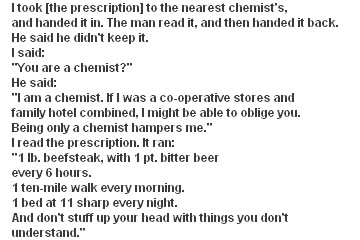
- If I was a co-operative stores and family hotel combined, I might be able to oblige you
Heavy financial consequences ...
In a society like ours, where the offer for health is oversized, the phenomenon of «medical zapping» will appear, where the sick person renews complete check-ups and specialized consultations as many times as he/she wants to. That situation, which is common to the rich countries, has taken such huge proportions in France (favored by the totally uncontrolled repayments of the French public welfare system) that the political authorities have tried to react in making the implicated parts feel guilty in campaigns to raise public awareness :
- - slogans on the subject « a medication is not to be taken lightheadedly» addressed to the sick people who take too many of them ;
- - the first infringements of the (holy) freedom of prescription with the publication, in 1989, of the « ORM» Opposable Medical References (by the public welfare offices) addressed to the doctors who prescribed too much or wrongly.
Yet, a minister said very recently on the radio that the sales of generic medications only had "a very minor effect on the public welfare system’s budget". "These campaigns have no other purpose than to contribute to make the mentalities evolve to make people understand that health has a price" he added.
Everything leads to thinking that the "True False Sick person" who takes care of that "sort of false true illness" will, on the short term, have to pay the expenses him/herself.
The tendency to make that kind of sick people (who are though exhausted) feel guilty is symptomatic of the way the medical profession considers it. Would anyone consume treatments for pleasure?
Heavy cognitive consequences ...
In order to no longer "prescribe lightheadedly", the doctor, aware that he/she’d better keep his/her patient turns towards "alternative" therapeutics.
Yet, that scientific backing provided by the medical profession to some illusory practices carries the germs of dangerous cognitive excesses towards sectarian practices. It partly explains the raise of the irrational that the sociologists notice day after day.
But, what is the answer by the light of sleep medicine ?
In our somnologist experience, that sick person that the medical profession (or the relatives) readily describes as a "false sick person", hypocondriac, or "imaginary" sick, probably suffers from an unefficient sleep. His/her symptoms fit into the broad chart which defines the hyposleep syndrome (cf.).
He/she is thus a truly sick person.
We will use the expression of « True False-sick » to describe the set of subjects who suffer from pathologies labelled as "imaginary" or "psychosomatic".
We think that the concept of "false sick" person wrongly brings a charge against the victims of a deep misunderstanding :
- On one hand, it is not right to pretend that healthy people would take medications or undergo (often unpleasant) examinations for the only sake of comforting themselves. If that was true, the placebo effect would work on the long term (a bit like some superstitions which often last all life long)
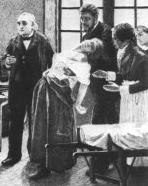
- Presentation, in 1886, of a case of "grand hysteria" by Charcot
The «hypocondriacs» are truly sick people ! Their anxiety is founded, they simply try to understand and treat their symptoms !
Is it obsessive to be afraid of illness ?
It may seem so for those who feel nothing wrong, but it is legitimate when the organs are no longer «silent» (as Leriche said).
No, it is not «obsessive to see a lot of doctors» when one is aware of the potential illnesses they could help to screen and take care of. - On the other hand, it is not accurate to pretend that if the normal check-ups do not explain the illness, that means it is "imaginary" and "psychological". That concept of psychosomatic diseases does not lead to any lasting solution because comforting a patient about the fact that his/her disorders are not bad does not make them disappear. To deny the reality of the illness brings the sick person to consult again or elsewhere until he/she loses all confidence in conventional medicine and turns towards alternative solutions.
That breaking up of the doctor-patient relationship is, in itself, devastating, because it is better to keep one’s patient than to see him/her turn towards wild dreams.
That means it would be better to use an ’usual language’ to give a meaning to a symptom, rather than holding oneself in check by claiming that "there is nothing wrong"...
That is why many doctors find themselves in the situation of writing long prescriptions, as if "a medication could be taken lightheadedly".
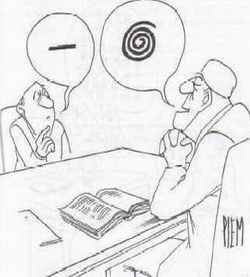
Finally, the symptoms of the "hyposleep syndrome" are so many and varied that it is very easy to make them "enter" into a large number of lesional pathology charts. The wish to give a sense to a symptom greatly favors the diagnosis bias.
That "organicisation" of the symptoms leads to the inverse situation of that of the True False-sick :
It is the False True-sick(cf).
Here, the medical profession tends to be overzealous and since a very thorough checkup is rarely 100% normal, the doctor and the sick person will be satisfied to find a meaning, a coherent explanation to the symptoms.
A diagnosis is finally carried out, there is finally a true illness to take care of ...
That "False True-sick" presents symptoms that match the illness that is put forward when one looks back at it. It is a biased reasoning meant to provide an "ad hoc" explanation [3] to a phenomenon that is observed and for which essential data are lacking to its understanding.

- More information...
- Biography of Dr Jean-Martin Charcot (in French) (site du Centre hospitalier Charcot).
- The imaginary invalid (1673) (scène X).
- Knock or the triumph of medicine. Play by Jules Romains (1885 -1972) (Let us not confuse the two : is it itching or is it scratching ?) (In French)
- Three men in a boat (to say nothing about the dog) (In French)
[1] "In One of the difficulties in psychoanalysis, Freud points out, since 1917, «the three great humiliations» from which «the universal narcissism» of man became its own victim under the effect of the scientific momentum :
-1°, the Copernician confirmation of the vanity of geocentrism,
-2°, the Darwinian discovery of the continuity between animal and man,
-3°, and, at last, "the externalization of the self", under the effect of the discovery of the unconscious structure of psychism". (Conference of the 8th of March, 2005 of the International Collège of Philosophy for France-Culture).
What a terrible lesson of humility for man who believed it mastered its behavior entirely !
The concepts of «somatisation» and «hysteria» seemed to be able to play a part in the genesis and treatment of some "non organic" illnesses ("issued from that strength that the mind possesses over the body", said Charcot, S. Freud’s mentor).
Author’s note: these conceptions and psychoanalytical theories which follow from them do not seem to have proven their efficiency in the treatment of illnesses described as "psychosomatic".
Back to text
[2] The Münchausen syndrome (or pathomimy) is considered to be a psychiatric pathology, characterized by the need to simulate an illness, without any direct profit seeking (which is different from "simulating", in the course of which the patient tries to obtain an advantage for his/her illness).
The patients who suffer of that syndrome present multiple scars from operations after repeated hospitalizations for symptoms that were thought to be urgent. They are readily litigious if they do not obtain the attention they think they deserve.
The "Studies on hysteria" are published in 1895 by Sigmund Freud, former disciple of French neurologist Jean-Martin Charcot (1825-1893), who suggested its theoretical basics in "The various nervous states induced by hypnotism in hysterical patients".
The concept of hysteria has evolved a lot since and modern psychiatry (See DSM-IV the Diagnostic and statistical manual of mental disorders, 4th edition) prefers the concept of somatoform disorder which simply describe "the physical symptoms that cannot be explained by a medical ailment" and are no longer placed in the same category as personality disorders like anxiety or obsessive compulsive disorders (OCDs).
Back to text
[3] Ad hoc is a Latin phrase which means "going towards where it has to go, formed for a precise aim". So, in the time when people believed that the Sun and the planets (a word that means "traveller") turned around the Earth, their course was explained by ad hoc 8 shaped trajectories ...
Back to text